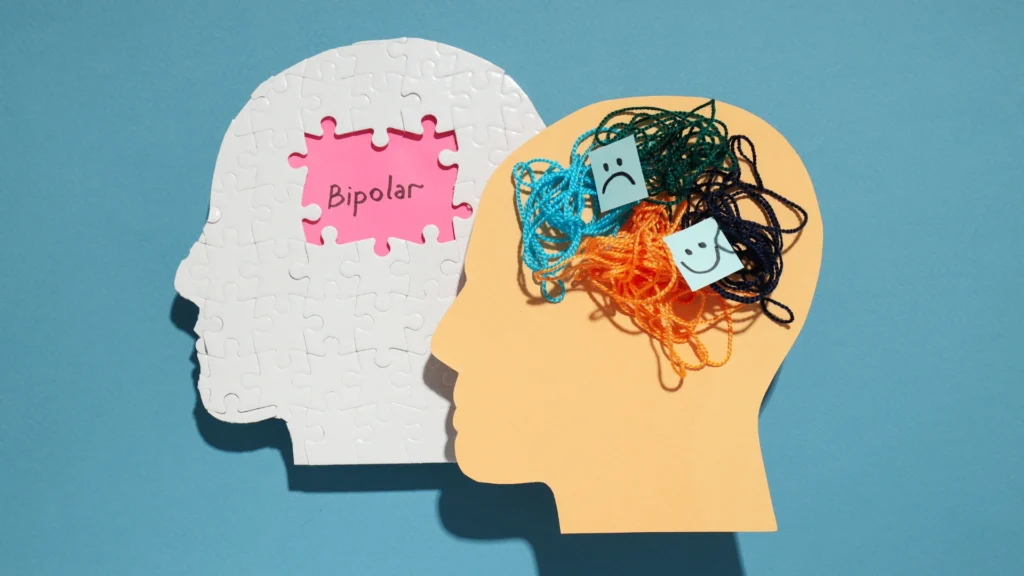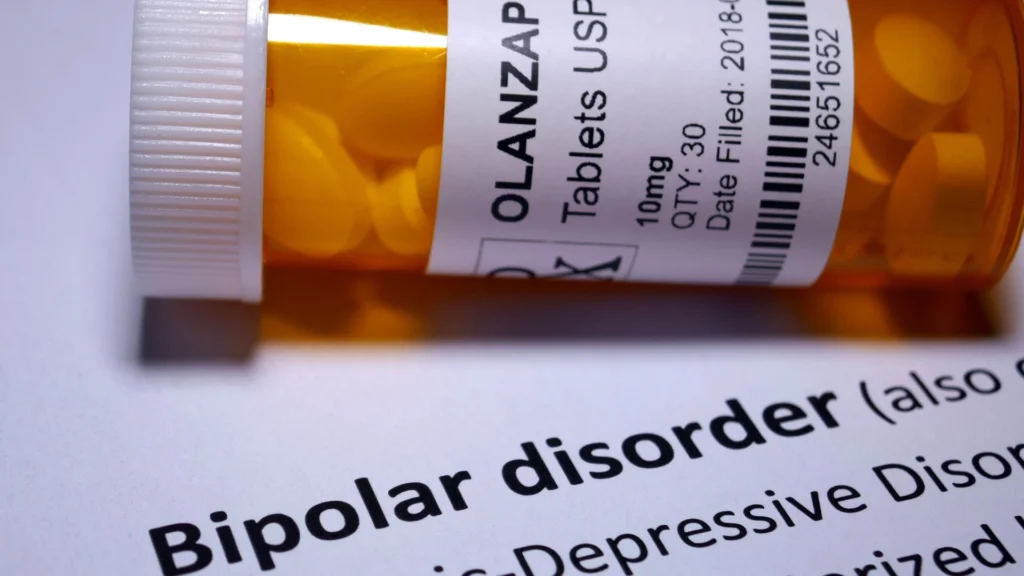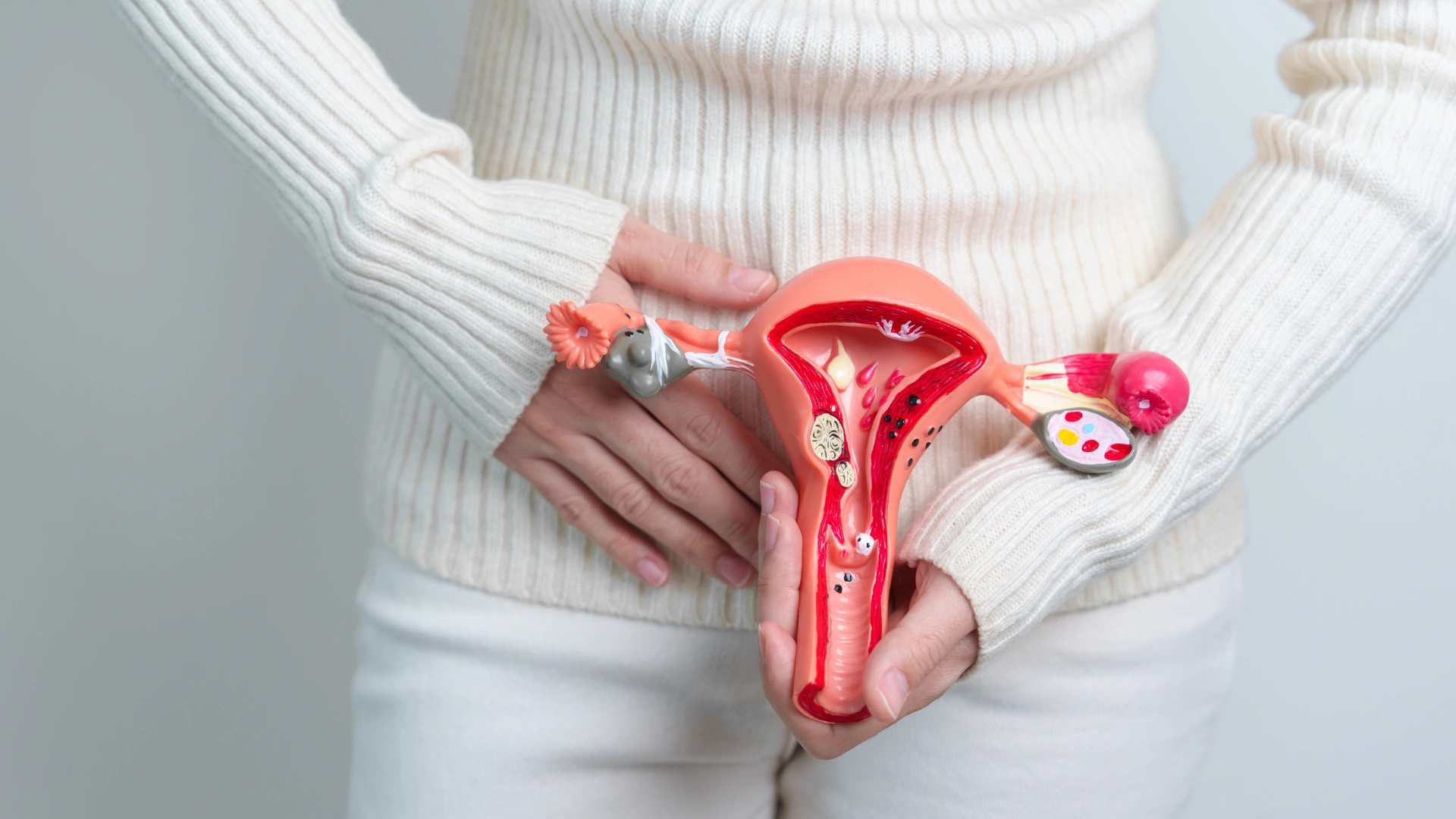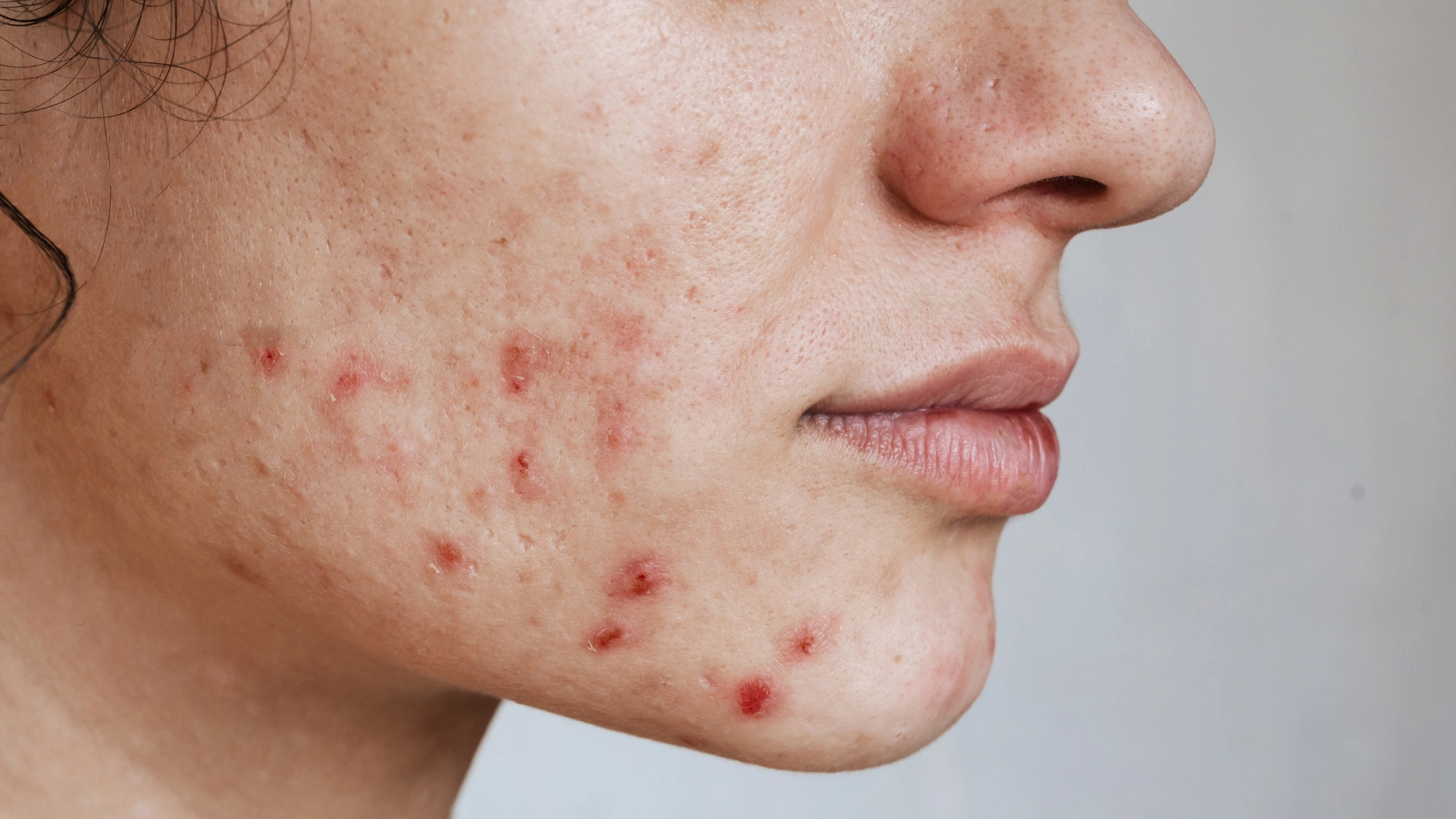
Approximately 2.8% of U.S. adults are affected by bipolar disorder, a condition that significantly impacts emotions, energy levels, and daily activities. Often misunderstood, this mental health disorder involves intense emotional highs and lows that can influence every aspect of life, including personal relationships and career aspirations. Bipolar disorder encompasses more than just mood swings; it is a complex condition characterized by a variety of forms, symptoms, and causes.
In this article, you will learn about the symptoms and causes of bipolar disorder, its impact on daily life, and how conventional treatments compare to emerging and alternative therapies. We’ll also explore holistic approaches, the science behind them, and exciting breakthroughs in bipolar disorder management.
Bipolar disorder – Symptoms and Causes: Overview
Bipolar disorder is a mental health condition that causes extreme mood changes, ranging from emotional highs (mania or hypomania) to deep lows (depressive episodes). There are three main types:
- Bipolar I Disorder: Characterized by at least one manic episode lasting a week or requiring hospitalization. Depressive episodes are common but not necessary for diagnosis.
- Bipolar II Disorder: Involves at least one hypomanic episode (a less severe form of mania) and one major depressive episode.
- Cyclothymic Disorder: Features periods of hypomanic and depressive symptoms that don’t meet full diagnostic criteria but persist over two years or more.
The symptoms of bipolar disorder vary depending on the type and phase. Common signs include:
- Mania: Euphoria, increased energy, impulsive behavior, decreased need for sleep, and rapid speech.
- Hypomania: Similar to mania but less intense and typically not severe enough to disrupt daily life.
- Depressive Episodes: Persistent sadness, fatigue, feelings of worthlessness, difficulty concentrating, and sometimes thoughts of self-harm.
Bipolar disorder can deeply affect personal and professional relationships. Mania might lead to reckless decisions or strained communication, while depressive episodes may cause withdrawal and reduced productivity. Without effective management, these fluctuations can disrupt stability, making maintaining commitments and emotional connections hard.
Common Symptoms and Causes
While the exact causes of bipolar disorder remain unknown, researchers identify several contributing factors:
- Genetics: A family history of bipolar disorder increases the risk.
- Brain Chemistry: Imbalances in neurotransmitters like serotonin and dopamine can play a role.
- Environment: Stressful life events or trauma may trigger the onset of symptoms in those predisposed.
Understanding these causes helps in creating effective treatment plans and prevention strategies. Managing bipolar disorder traditionally involves medications, psychotherapy, or a combination of both. While these methods can be effective, they come with challenges:
- Side Effects: Medications like lithium or antipsychotics may cause weight gain, fatigue, or other side effects.
- Dependency: Some treatments require long-term adherence, which can lead to psychological or physical dependency.
- Resistance: Not all patients respond well to conventional options, prompting interest in alternative approaches, including natural remedies for bipolar disorder.
The Science Behind Holistic Treatments for Bipolar

Holistic treatments for bipolar disorder focus on addressing the whole person—mind, body, and lifestyle—rather than just managing symptoms. These alternative therapies complement conventional treatments using non-invasive, natural approaches. Research highlights that alternative therapies, such as nutritional changes, mind-body practices, and herbal remedies, may help regulate mood by reducing inflammation, balancing neurotransmitters, and enhancing overall brain health.
Studies have shown that yoga and meditation can lower cortisol levels (the stress hormone), improving emotional regulation. While holistic methods are not a replacement for medical treatments, they are gaining interest for their potential to reduce reliance on medications and their associated side effects. Safety and effectiveness remain the key concerns, and ongoing research continues to explore how these therapies can best serve individuals with bipolar disorder.
Popular Alternative Therapies for Bipolar Disorder
Alternative therapies for bipolar disorder are gaining popularity as individuals seek additional ways to stabilize their mood and reduce the challenges of conventional treatments. Below are some of the most researched and promising options.
Nutritional Interventions
Diet plays a significant role in brain function and mood stability. Specific nutrients have been linked to improved mental health, particularly for individuals with mood disorders. Omega-3 fatty acids, found in fish oil, have shown promise in reducing depressive and manic symptoms due to their anti-inflammatory properties. Magnesium and folate are also known to support neurotransmitter regulation.
For instance, magnesium can help calm the nervous system, while folate aids in producing serotonin. Studies have shown that individuals with bipolar disorder often benefit from incorporating these nutrients into their diet, either through food or supplements, as part of a broader treatment plan.
Mind-Body Practices
Mind-body practices help in managing stress and stabilizing mood, which are essential for individuals with bipolar disorder. Yoga and meditation have been shown to reduce stress by promoting relaxation and improving focus. Tai chi and qigong, ancient practices involving gentle movements and deep breathing, help with emotional regulation and overall mental clarity.
Biofeedback and neurofeedback are technological approaches that teach individuals to control physiological responses, such as heart rate and brainwaves, to manage emotional fluctuations. These practices are non-invasive and can be easily integrated into daily routines, making them accessible and beneficial.
Herbal and Natural Remedies
Herbal remedies are often considered for their potential mood-stabilizing properties. St. John’s Wort, commonly used for mild to moderate depression, may offer benefits, though caution is needed due to interactions with medications. Rhodiola Rosea and Valerian Root have also been studied for their calming effects and ability to reduce stress. These remedies are frequently sought by those interested in treating bipolar without medication.
CBD oil, derived from cannabis, has gained attention for its potential to stabilize mood, though research is ongoing, and expert guidance is essential for safe usage. While these remedies can be helpful, they should always be cautiously approached to avoid negative interactions with prescribed treatments.
Light Therapy
Light therapy is particularly effective for individuals with seasonal mood swings or depressive episodes of bipolar disorder. This therapy involves exposure to a specialized light box that mimics natural sunlight, helping to regulate sleep patterns and mood. Experts recommend using light therapy in the morning for about 20-30 minutes daily. While generally safe, improper use or overexposure may trigger mania in some individuals, so it’s crucial to follow expert guidelines.
Exercise as Therapy
Physical activity directly impacts mood regulation, making exercise a valuable complementary therapy. Walking, swimming, or dancing release endorphins, naturally improving mood and reducing stress. Regular exercise also enhances sleep quality, a critical factor for individuals with bipolar disorder. Structured exercise routines can provide stability and control, aiding in emotional balance.
Holistic Medicine Approaches
Holistic medicine combines various therapies, such as acupuncture, aromatherapy, and energy healing, to address mood disorders like bipolar disorder. These approaches focus on balancing the body’s energy systems and promoting relaxation. While evidence for their effectiveness is still emerging, many individuals report subjective improvements in their mood and stress levels after incorporating these treatments.
Alternatives to Lithium for Bipolar
Lithium has been a standard treatment for bipolar disorder for decades, but it is not suitable for everyone due to its side effects and the need for regular blood tests. Fortunately, several alternatives are available that may help manage mood swings and stabilize emotions without the challenges associated with lithium.

Medications such as mood stabilizers like valproate (Depakote) and carbamazepine (Tegretol) are often prescribed to reduce manic episodes. Atypical antipsychotics like quetiapine (Seroquel) and aripiprazole (Abilify) can also help with both mania and depression. For those experiencing depressive episodes, medications like lamotrigine (Lamictal) may be considered. Additionally, there are some over-the-counter bipolar medications, such as supplements, that can support mood stabilization, though they should be used with caution.
Non-drug options like psychotherapy, including cognitive-behavioral therapy (CBT), can also play a key role in treatment.
Emerging Therapies for Bipolar Disorder in 2025
Advancements in mental health treatments have led to new and innovative therapies for managing bipolar disorder. These emerging options focus on improving mood stability and addressing underlying factors of the condition. Here are some promising therapies to watch for in 2025.
Psychobiotics and Gut Health
The connection between gut health and mental health, known as the gut-brain axis, is an exciting area of research. Psychobiotics, which are specific strains of probiotics, have been shown to influence mood by producing neurotransmitters like serotonin. Promising psychobiotic strains, such as Lactobacillus and Bifidobacterium, are being studied for their ability to reduce inflammation and improve emotional balance. Research suggests that incorporating these probiotics into the diet could complement traditional treatments, offering a new way to manage bipolar symptoms.
Transcranial Magnetic Stimulation (TMS)
TMS is a non-invasive therapy that uses magnetic fields to stimulate nerve cells in the brain. It has been approved for treating depression and is now being studied for bipolar disorder. TMS targets areas of the brain associated with mood regulation, helping to stabilize emotional highs and lows. Clinical trials report success rates of up to 60% in reducing depressive episodes in individuals with treatment-resistant bipolar disorder. Experts believe that TMS could become a valuable option for those who do not respond well to medications.
Psychedelic-Assisted Therapy
Psychedelic-assisted therapy involves using substances like ketamine, psilocybin (found in magic mushrooms), and MDMA in controlled clinical settings to treat mental health disorders. These substances are thought to help “reset” brain activity, reducing symptoms of depression and emotional instability.
Early trials have shown encouraging results, particularly with ketamine for managing depressive episodes in bipolar disorder. While ethical considerations and long-term effects are still under review, psychedelic-assisted therapy represents a promising frontier in mental health care.
Can Acupuncture Help Manage Bipolar Symptoms?
Acupuncture, an ancient practice rooted in traditional Chinese medicine, is increasingly being explored as a complementary treatment for mental health disorders, including bipolar disorder. This therapy involves inserting thin needles into specific points on the body to restore balance and regulate energy flow, known as qi.
Research indicates that acupuncture may help manage some symptoms of bipolar disorder by reducing stress, anxiety, and mood fluctuations. The practice is believed to influence the nervous system, promoting the release of mood-regulating chemicals like serotonin and endorphins. In some cases, individuals have reported a reduction in the intensity of depressive and manic episodes after regular acupuncture sessions.
While acupuncture is not a standalone treatment for bipolar disorder, it can complement conventional therapies. It is considered safe when performed by a qualified practitioner, with minimal risks. However, its effectiveness varies from person to person, and more studies are needed to confirm its role in managing bipolar symptoms fully.
How Does Meditation Impact Bipolar Disorder?

Meditation is a known practice for calming the mind and reducing stress. For individuals with bipolar disorder, meditation can help regulate emotions, improve focus, and reduce the intensity of mood swings. Practices like mindfulness meditation encourage individuals to become more aware of their thoughts and feelings without judgment, which can be helpful during both manic and depressive episodes.
Meditation may lower cortisol levels (a stress hormone) and improve brain connectivity, leading to better emotional balance. Even as short as 10 minutes a day, regular meditation sessions have been linked to improved sleep quality and overall mood stability. While meditation is not a cure, it is a valuable tool for managing symptoms alongside traditional treatments.
What Is Biofeedback Therapy?
Biofeedback therapy is a technique that helps individuals gain control over physiological processes like heart rate, muscle tension, and brain activity. This therapy uses sensors connected to a monitor to display real-time feedback on these processes. By learning to regulate these functions, individuals with bipolar disorder can better manage stress and emotional responses.
For bipolar disorder, biofeedback is particularly effective in reducing symptoms like anxiety and irritability. It helps individuals recognize physical signs of stress or mood changes and teaches them how to respond to minimize these effects. The therapy is non-invasive, safe, and can be combined with other treatments to improve overall symptom management.
Can You Live to 80 With Bipolar?
Yes, many individuals with bipolar disorder can live long, fulfilling lives, including reaching or exceeding the age of 80. Advances in treatment, increased awareness, and effective symptom management have significantly improved the quality and longevity of life for those with bipolar disorder. Maintaining a stable treatment plan, practicing self-care, and addressing physical health needs are critical factors in achieving a long life. Ongoing support from family, friends, and mental health professionals also plays a vital role.
What Is the First Red Flag of Bipolar Disorder?
The first noticeable sign of bipolar disorder is often a sudden and extreme change in mood or behavior. For some, this may manifest as a manic episode with heightened energy, irritability, or impulsiveness. For others, it could appear as a depressive episode marked by sadness, fatigue, and a loss of interest in activities. These changes are typically more intense and prolonged than typical mood swings and can disrupt daily life. Early recognition of these signs is crucial for seeking timely help and starting treatment.
What Calms Bipolar Disorder?
Managing bipolar disorder often involves a combination of strategies to stabilize mood and reduce stress. Maintaining a consistent routine, engaging in regular physical activity, and practicing relaxation techniques such as meditation or deep breathing can help. Additionally, proper sleep hygiene and a healthy diet play a role in calming symptoms. Complementary therapies like yoga or acupuncture may also provide relief. For many, following a treatment plan that includes prescribed medications and therapy is key to achieving stability.
Is Gaba Safe for Bipolar?
GABA (gamma-aminobutyric acid) is a neurotransmitter that helps calm the nervous system. Supplements that boost GABA levels are often marketed for reducing anxiety and improving mood. While some individuals with bipolar disorder may benefit from GABA supplements, their safety and effectiveness are not universally established. It is important to approach GABA supplementation cautiously, as interactions with medications or exacerbation of symptoms could occur. Consulting with a mental health professional before use is essential.
How to Fix Bipolar Disorder Without Meds?
While medications are often the cornerstone of bipolar treatment, some individuals explore non-medication approaches to manage their symptoms. Lifestyle changes like regular exercise, a balanced diet, and consistent sleep schedules can help stabilize mood. Holistic therapies may also provide support, including mindfulness meditation, yoga, and acupuncture. Psychotherapy, like cognitive-behavioral therapy (CBT), teaches coping skills and emotional regulation techniques. While these methods can be helpful, they are often most effective when combined with professional guidance and ongoing monitoring.
Is Bipolar Genetic?
Yes, genetics play a significant role in bipolar disorder. Studies show that individuals with a close family member, such as a parent or sibling, who has bipolar disorder are at a higher risk of developing the condition. However, genetics is only part of the picture. Environmental factors, brain chemistry, and life events also contribute to the development of bipolar disorder. Understanding the genetic component can help in early identification and management strategies.
Why Do Bipolar People Wear Sunglasses?
Many individuals with bipolar disorder experience heightened sensitivity to light, especially during manic or depressive episodes. Sunglasses help reduce light exposure, which can minimize overstimulation and improve comfort. For some, wearing sunglasses may also help regulate circadian rhythms, as light exposure influences sleep patterns. This practical step can be particularly useful for managing mood swings triggered by sensory overload.
The Bottom Line
Managing bipolar disorder requires a consistent and personalized approach, combining effective treatments and supportive strategies. Traditional options like medications and therapy remain essential, but exploring complementary therapies such as mindfulness, nutrition, exercise, and emerging technologies can provide additional support. By staying informed about new treatments and understanding the condition, individuals with bipolar disorder can achieve better emotional stability and improved daily functioning.









